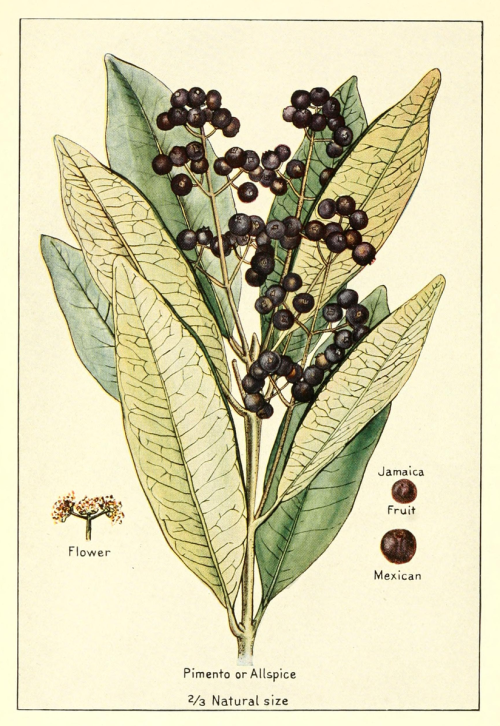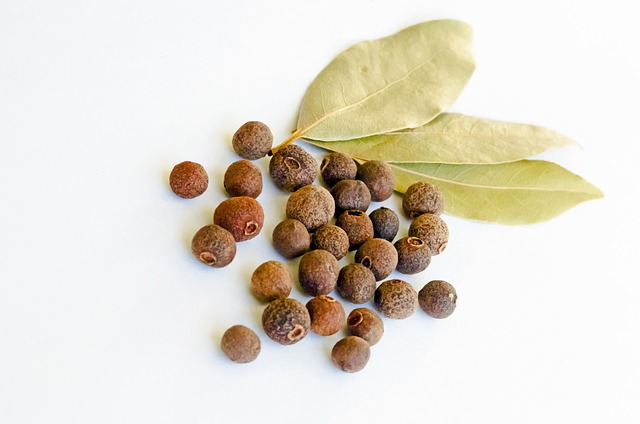 Have you ever wondered what, exactly, allspice is? Well, I found myself wondering recently, and I thought I would pass on my newfound wisdom on the ways of allspice. Enjoy!
Have you ever wondered what, exactly, allspice is? Well, I found myself wondering recently, and I thought I would pass on my newfound wisdom on the ways of allspice. Enjoy!
What is Allspice?
Botanically speaking, this spice is known as Pimenta officinalis, and it comes from the Jamaican Pepper Tree. While it is said to be native to south and central America, it was most famously shared with the world after its discovery in Jamaica in the West Indies: this is where Columbus discovered the stuff. Per the Farmers Almanac, a physician on the ship declared the tree had the "finest smell of cloves" he had ever encountered.
Allspice comes from the dried berry of the pimento tree, a tropical tree which can range in size from 20-40 feet, which is related to the myrtle and features thick, elliptical-shaped leaves. In the spring and summer, the tree produces white blooms, which are followed by the pea-sized berries in the fall. These berries are dried and ground to produce the allspice we know.
What about the name?

As I discovered on About Food,
Allspice comes by its name for a very good reason. The berries have a combined flavor of cinnamon, nutmeg, and cloves with a hint of juniper and peppercorn. Some enterprising spice companies sell a mixture of spices as allspice, so be sure and check the ingredients on the label to be sure you are getting the real thing. Allspice is often called pimento, not to be confused with the capsicum pepper pimiento, which is a vegetable, not a spice.
How to use it
- Since it tastes like a blend of cinnamon, nutmeg, and cloves, it is a frequent component of baked goods, especially in the fall. It is notably part of pumpkin pie spice.
- It can be used in Jamaican (savory) cookery. Known as Jamaican pepper, it is part of jerk spice mixes.
- In Polish cooking, it is called kubaba and adds a certain je ne sais quoi to pot roasts and stuffings.
8 tasty recipes featuring allspice
I think these ones sound like winners, don't you?
- Easy Jerk Chicken
- Radicchio and fruit salad with allspice dressing
- White Sands Hot Chocolate (featuring rum, coconut, allspice, and--interestingly--mango)
- Apple allspice crumb muffins
- Spiced doughnut holes
- Vanilla-allspice thumbprint cookies
- Molasses spice cookies
- Peaches and cream pie
Substituting allspice in recipes
If you don't have allspice on hand, this spice substitution guide suggests cinnamon; cassia; dash of nutmeg or mace; or dash of cloves. Or, follow the example of The Humbled Homemaker and mix equal parts cinnamon, nutmeg, and cloves.
Interesting facts
- Once upon a time, flowers were given as symbolic gestures. Bright yellow allspice buds were seen as a symbol of compassion. (find more flower symbolism here)
- Allspice is a curative, and is considered a remedy for health issues as wide ranging as muscle aches, indigestion, and fever.
- Allspice was named due to its scent, which is a combination of cinnamon, nutmeg, and cloves. Pimento was given its name by Spanish and Portuguese explorers, who thought the dried berries looked like peppercorns, and called them “pimenta”, or pepper. (source)

